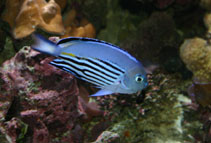| Family: |
Pomacanthidae (Angelfishes) |
| Max. size: |
15 cm TL (male/unsexed) |
| Environment: |
reef-associated; marine; depth range 21 - 81 m, non-migratory |
| Distribution: |
Pacific Ocean: Taiwan to the Tuamoto Islands, north to the Ryukyu Islands, south to New Caledonia and the Austral Islands. |
| Diagnosis: |
Dorsal spines (total): 15-16; Dorsal soft rays (total): 15-16; Anal spines: 3-3; Anal soft rays: 14-17. Males light blue with 8 black stripes on the lower 2/3 of the body (the posterior end of the uppermost yellow, the lowermost stripes extending the adjacent anal fin); females light blue with a vertical black bar above the eye and spots on the forehead; both sexes with a broad submarginal band on the dorsal and anal fins; females with broad submarginal band on the caudal-fin lobes. |
| Biology: |
Occurs in current-swept outer reef slopes and drop-offs (Ref. 4859). Feeds on plankton. Forms harems of 2-5 individuals. Occasionally exported through the aquarium trade (Ref. 48391). |
| IUCN Red List Status: |
Least Concern (LC); Date assessed: 08 October 2009 Ref. (130435)
|
| Threat to humans: |
harmless |
Source and more info: www.fishbase.org. For personal, classroom, and other internal use only. Not for publication.
